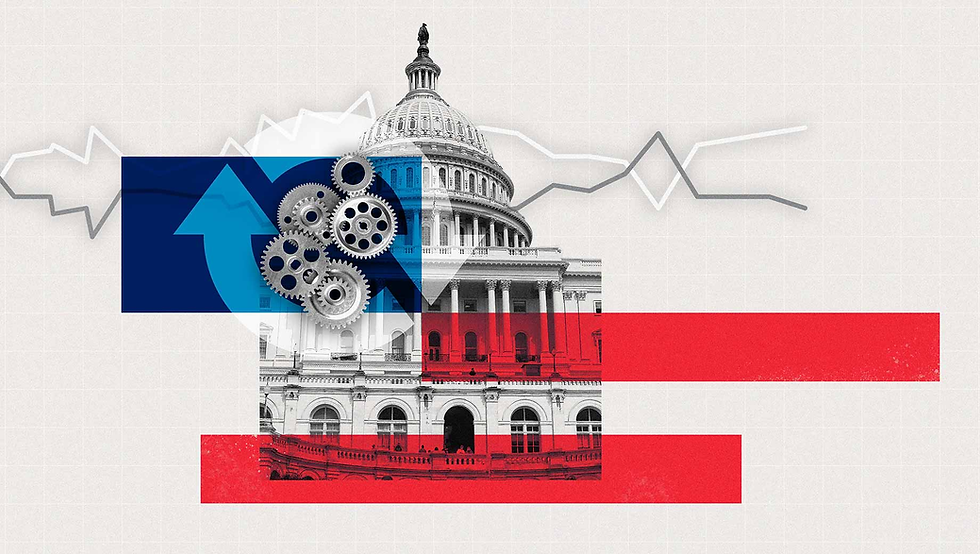What D.O.G.E. Is and What D.O.G.E. Isn’t: Let’s Clear the Air
- Mike Herrera

- Feb 9, 2025
- 4 min read
The Department of Government Efficiency (D.O.G.E.) has been making some noise lately, and like clockwork, the internet has turned it into a guessing game. Is it a meme? A cryptocurrency? A secret group of bureaucrats plotting world domination? Yeah, no. None of the above. So, let’s cut through the noise, set the record straight, and talk about what D.O.G.E. actually is, what it’s not, and how it fits into a long (and sometimes surprisingly successful) history of government trying to get its act together. You ready? Let’s dive in.

What D.O.G.E. IS
Let’s start with the facts—the good stuff. Here’s what D.O.G.E. is and why it exists: ✅ A Temporary Initiative
D.O.G.E. isn’t here forever, folks. Officially called the U.S. DOGE Service Temporary Organization, it’s a short-term project. The goal? Find inefficiencies, call them out, and recommend ways to fix them. It’s not some new permanent federal agency like the Department of Defense or Education. It’s more like a task force with a time limit.
✅ A Rebranding of the U.S. Digital Service (USDS)
If you’re thinking, “Wait, wasn’t there already something like this?”—you’re absolutely right. The U.S. Digital Service (USDS) was launched under President Obama to modernize government tech and improve digital services (think: fixing broken websites). D.O.G.E. takes that foundation and amps it up by focusing on cutting waste and improving efficiency in federal spending. ✅ Focused on Transparency
D.O.G.E.’s main job is to shine a light on where government spending is going off the rails. It’s like that one friend who goes through your bank statements and says, “Hey, maybe cancel that subscription you haven’t used in six months?” Annoying, sure—but necessary. ✅ Equipped with ‘Read-Only’ Access
Here’s the kicker: D.O.G.E. can’t actually change anything. It has “read-only” access to government systems, which means it can analyze spending and operations but can’t approve payments, alter budgets, or mess with anything. Its job is to observe, report, and recommend—not control.
What D.O.G.E. ISN’T
Alright, let’s bust some myths. Here’s what D.O.G.E. isn’t:
❌ Not a Permanent Federal Department
This isn’t the next big thing in government bureaucracy. D.O.G.E. is temporary. Once its mission is complete, it’s out.
❌ Not a Decision-Making Body
D.O.G.E. can analyze and recommend all day, but it doesn’t have the authority to enforce anything. Think of it like a consultant—you can take its advice or leave it.
❌ Not a Replacement for Existing Oversight Agencies
We already have agencies like the Government Accountability Office (GAO) and the Office of Management and Budget (OMB) keeping an eye on government spending. D.O.G.E. is just another tool in the toolbox—not a replacement for those agencies.
❌ Not Related to Cryptocurrency or Memes
Yes, we know—“D.O.G.E.” shares its name with Dogecoin, and the internet loves a good laugh. But this D.O.G.E. has nothing to do with cryptocurrency, memes, or Elon Musk tweets. Sorry to disappoint.
❌ Not a Legislative Body
D.O.G.E. doesn’t make laws. It doesn’t even propose them. Its role is purely advisory—it’s here to highlight problems and suggest solutions, not rewrite the rulebook.
What D.O.G.E. CAN and CANNOT Do
What D.O.G.E. CAN Do
🔍 Audit and Review Spending: With its read-only access, D.O.G.E. can dig into government data and figure out where taxpayer money is being wasted.
📢 Publicize Findings: D.O.G.E. can call out inefficiencies and fraud, putting public pressure on lawmakers and agencies to clean up their act.
💡 Advise on Reforms: It can suggest smarter ways to spend money and streamline government processes.
What D.O.G.E. CANNOT Do
🚫 Approve or Deny Spending: D.O.G.E. doesn’t get to decide where the money goes. It’s not holding the purse strings.
🚫 Make Changes to Systems: Its read-only access means it can watch and report, but it can’t change anything.
🚫 Enforce Recommendations: D.O.G.E. can suggest fixes, but it’s up to lawmakers and agencies to actually do something about them.
Government Efficiency Is Bipartisan
Here’s the thing: making government more efficient isn’t a partisan issue. Both Democrats and Republicans have launched initiatives like this before. Let me jog your memory with a few examples:
1. Truman Committee (1941)
During World War II, Senator Harry S. Truman (Democrat) led the Senate Special Committee to Investigate the National Defense Program—aka the Truman Committee.
Key Results:
Saved taxpayers $15 billion (over $250 billion today) by uncovering fraud and waste in defense spending.
Improved oversight of defense contractors.
Cemented Truman’s reputation as a no-nonsense leader, which eventually helped him become president.
2. Hoover Commission (1947)
Under President Truman, former President Herbert Hoover (Republican) led a commission to reorganize the executive branch after WWII.
Key Results:
Proposed sweeping reforms to improve efficiency in federal agencies.
Gave the president more authority to streamline operations.
Set a precedent for future efficiency efforts.
3. Reagan’s Grace Commission (1982)
President Reagan (Republican) launched the Grace Commission to identify inefficiencies in federal operations.
Key Results:
Produced 2,500 recommendations for reducing waste.
Estimated potential savings of $424 billion over three years.
Not every recommendation was implemented, but it sparked important conversations about cost control.
4. Clinton’s National Partnership for Reinventing Government (1993)
Vice President Al Gore (Democrat) led this initiative to modernize government and make it more customer-focused.
Key Results:
Claimed to save $136 billion by reducing inefficiencies and improving processes.
Encouraged federal agencies to innovate and be more accountable.
The Bottom Line
D.O.G.E. is just the latest chapter in a long history of bipartisan efforts to make government work better. Its job is simple: analyze, advise, and advocate for smarter spending.
It’s not here to make laws, control budgets, or enforce changes. Instead, it’s like that watchdog at the front door—barking at inefficiencies and shining a light on how taxpayer money is spent. Whether you lean left, right, or somewhere in the middle, I think we can all agree: a little less waste and a little more transparency is a win for everyone.
🐾 Think of D.O.G.E. as your government watchdog—keeping things transparent and holding the system accountable, one audit at a time. 🐾
Sources:
https://apnews.com/article/treasury-systems-trump-bessent-doge-musk-08eb241fc60807b5e1c7b35fcdaee245



Comments